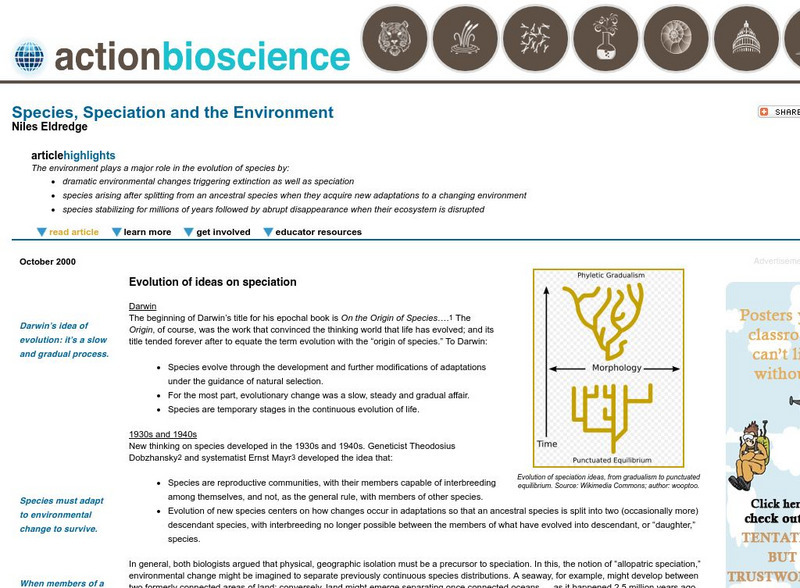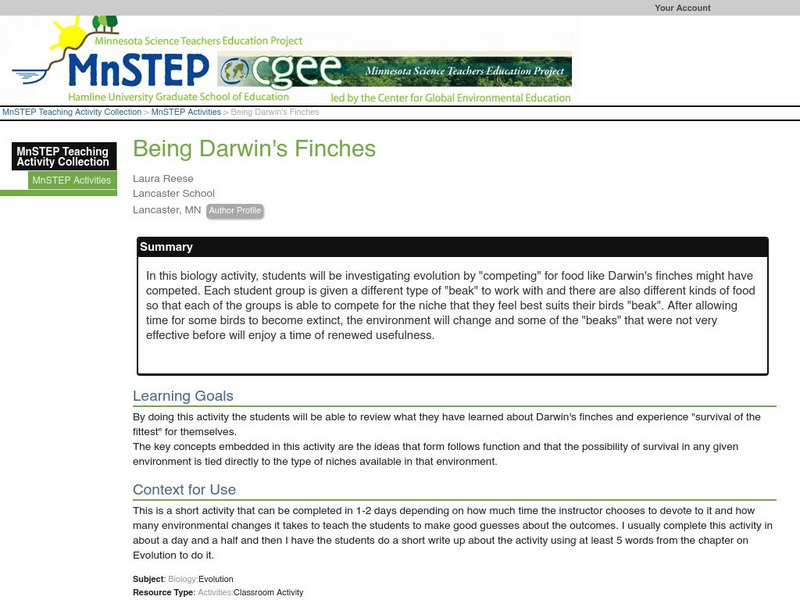Hi, what do you want to do?
Curated OER
Evolution and Geological Time
In this evolution worksheet, students review the geological time scale and how evolution has taken place over time. This worksheet has 13 fill in the blank questions.
Curated OER
White-tailed Deer: Beauty or Beast?
High schoolers use study guides and videos to discuss the positive and negative impacts of white-tailed deer populations. For this wildlife management lesson, students view slides and discuss the natural history and value of deer as a...
Curated OER
Ecology: Symbiosis
Eighth graders identify various types of symbiotic relationships. In this ecology lesson, 8th graders predict whether certain organisms can form symbiosis with other organisms. They discuss and defend their reasoning.
Curated OER
Ecology: Effects of Land Use on Natural Streams
Eighth graders examine how humans affect various ecosystems. In this ecology lesson, 8th graders discuss different ways that contaminants enter the stream. They explain the consequences of eutrophication in lakes.
Curated OER
Ecology: Adaptations
Eighth graders identify different types of adaptation in organisms. In this biology lesson, 8th graders explain how adaptation help organisms survive. They complete a worksheet at the end of the lesson.
Curated OER
Introduction to Paleontology Lab
Students engage in a lab which introduces them to fossils and paleontology. They examine eleven numbered boxes containing fossils which are related to the questions on this lab then answer questions on a lab sheet imbedded in this plan.
Curated OER
Rapid Mycological Assessment
Learners examine types of mycology methods. They practice using new vocabulary and answer key questions. They complete a field survey and analyze their results.
Curated OER
Posters and People
Middle schoolers create and design posters reflecting the types of litter harmful to aquatic wildlife. They explain the dangers of fishing line to aquatic wildlife, plastic bags to dolphins, and fish nets to fish. They design a poster...
Concord Consortium
Concord Consortium: Stem Resources: Changes in the Environment
An activity to help students understand that as the environment changes, plants and animals must evolve to stay alive. Students watch as a mystery plants grow in a changing environment to see if they will evolve or go extinct.
CK-12 Foundation
Ck 12: Life Science: Mass Extinctions
[Free Registration/Login may be required to access all resource tools.] An organism goes extinct when all of the members of a species die out and no more members remain. Extinctions are part of natural selection. Species often go extinct...
The History Cat
The History Cat: Geography: Environment: Tigers on the Brink
Discusses the threats faced by the Bengal Tiger in India that are bringing it to the brink of extinction. These include loss of habitat, loss of food sources, and poaching.
Center for Educational Technologies
Earth Science Explorer: Dinosaur Floor
Take a tour of the dinosaur floor and you'll read several theories about why dinosaurs became extinct.
American Institute of Biological Sciences
Action Bioscience: Species, Speciation and the Environment
The American Institute of Biological Sciences offers this article by Niles Eldredge, evolutionary theorist and curator at the American Museum of Natural History. Eldredge begins with Darwin's theories and summarizes subsequent thought,...
TeachEngineering
Teach Engineering: Competing Evolved & Engineered Digital Organisms
Students engineer and evolve digital organisms with the challenge to produce organisms with the highest fitness values in a particular environment. They do this through use of the free Avida-ED digital evolution software application. The...
OneWorld UK
One World: Stop Life in Danger
Elementary students will appreciate the cartoon style fact clips as the evolution of life on earth is laid out. Diversity, survival of the fittest, and ideas to help the environment are all included. An entertaining site for younger...
TED Talks
Ted: Ted Ed: The Case of the Vanishing Honeybees
A lesson investigating the decreasing population of the US honeybee population. There is a video that explores possible causes and the effect this decrease has on our environment. After the video, the students can test their knowledge...
The Franklin Institute
Franklin Institute: Ecosystems, Biomes, and Habitats
This site is provided for by The Franklin Institute Online. "Open the door and step into your ecosystem." Content describes ecosystems and related material such as biomes, habitats, energy cycle, extinction, recycling, and more.
Texas A&M University
Ocean World: Bringing the Ocean to the Classroom
Online resource for students and teachers to see information on icebergs, fisheries, coral reefs, waves, currents and more. Provides teachers with learning activities. Has its own ask-an-expert site (Ask Dr. Bob), and provides real-time...
Science Struck
Science Struck: Flora and Fauna of the Ordovician Period
Describes plants and animals that lived during the Ordovician Period, where it falls in the geologic time scale, tectonic activity happening then, the climate and environment, and extinction events.
Bagheera
Bagheera: Endangered Species
Bagheera provides an education site devoted to educating people about vanishing and extinct animals and their impact on the environment.
PBS
Pbs Teachers: Why Does Evolution Matter Now?
Discover how evolution affects your world and how understanding evolution can help solve problems in medicine, agriculture, and the environment. Investigate the growing problem of antibiotic resistance.
CK-12 Foundation
Ck 12: Earth Science: Adaptation and Evolution of Populations
[Free Registration/Login may be required to access all resource tools.] Explains how natural selection favors certain traits in a population so that the organism adapts to its environment, and that changes in the genes over time cause...
Science Education Resource Center at Carleton College
Serc: Being Darwin's Finches
In this biology activity, learners will be investigating evolution by "competing" for food like Darwin's finches might have competed. Each student group is given a different type of "beak" to work with and there are also different kinds...
American University
Deforestation in Madagascar
Gives history of Madagascar's cultural and economic development in relation to its land clearing practices. Cites biological species indigenous to the island, and their imminent destruction. Includes links to several case studies.

























